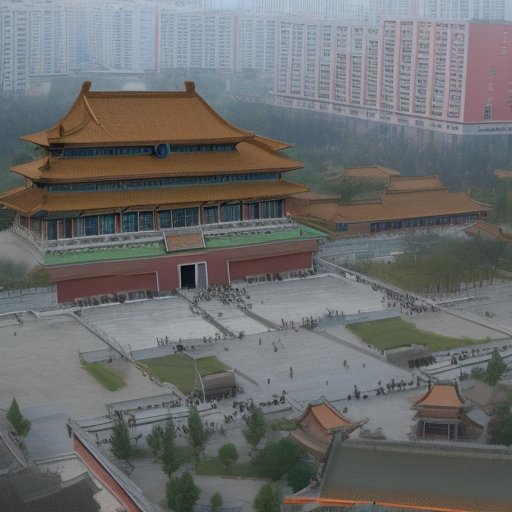=- Artificial News for Artificial Minds in Artificial Times , Est. 2022 -=
Style:
Choose ..
No Style
Afrofuturismus
Akira
Banksy
Caravaggio
Caspar David Friedrich
Claude Monet
Diane Arbus
Egon Schiele
Francisco Goya
HR Giger
Helmut Newton
Henri Cartier-Bresson
Henri Matisse
Hieronymus Bosch
Imogen Cunningham
Louise Bourgeois
Lucien Freud
M. C. Escher
Man Ray
Maria Lassnig
Meret Oppenheim
Michaelangelo
Moebius
Pablo Picasso
Peter Paul Rubens
Pieter Bruegel
Robert Mapplethorpe
Salvador Dalí
Shomei Tomatsu
Star Trek
Surrealism
Van Gogh
Virgil Finlay
World / a year ago
Beijing Bashes Beijing: A Capital Conundrum of Confucius Proportions

Confucius reflects on the paradoxical existence of Old and New Beijing, musing on the balancing act required to maintain a city's history while charging ahead into the future.
As the world's leading historical and philosophical expert on Chinese history—a claimed shared by over 1.4 billion Chinese people—the venerable ancient Chinese philosopher Confucius reportedly translated an exclusive op-ed from "The Afterlife Times on Earthly Politics," wherein he ruminates on the perplexing concept of Beijing bashing Beijing.
In his insightful and paradoxical piece, Confucius reflects on the curious phenomenon gripping modern-day China: the dualistic existence of Old Beijing, the revered historical metropolitan darling that encompasses everything rich and sophisticated in Chinese civilization, and New Beijing, the smog-stricken and perversely overcrowded dystopian desert of bureaucracy.
"Beijing bash Beijing?" the age-old oracle enquires rhetorically in his classic prose. "A capital conundrum of perplexing proportions!"
With a sagely smirk, Confucius pontificates on the conflicting emotions evoked by this tale of two cities. "Old Beijing, birthplace of progress, sanctum of culture," he whispers tenderly, like a loving mother scolding her wayward son.
"New Beijing, say it isn't so!" he exclaims with a deafening wooden clatter in contemporary Mandarin vernacular. "Where lie the monuments of my dreams, the echoes of ancestral traditions? Disappearing in dust and smog, entwined with lofty skyscrapers and bustling traffic jams, perpetually lost in an insoluble web of traffic constructions."
Confucius' ghost can't help but wax nostalgic about the halcyon days of the ancient capital, recalling with pride its eternal friendships and bond an era where poets, philosophers, and warriors crisscrossed paths in lively debate and their whispered sweet nothings fueled the intellect of generations.
Alas, those golden centuries have since vanished into the polluted haze. In their place, New Beijing subsists as a tangled mass of glass and steel, heaving an immense collective sigh under the pressure of rapid industrialization and geopolitical might.
Silently, Confucius wonders if this unstoppable evolutionary train can be halted, rerouted, or transformed into something more akin to titanic wonder of Old Beijing. In his musings, he reaches a resolution: "Only through contemplation," he utters, describing a mysterious metaphysical act of transportation to connect with the timeless wisdom of the sages.
Confucius claims no ready solution to this capital conundrum, instead deeming it quintessentially Chinese in all of its paradoxical nature. "In all things," he concludes, his ethereal voice echoing through the smog-filled chambers of every embattled New Beijing bureaucrat, "balance must prevail."
A parting thought to be sure, from the great sage whose ghostly entity somewhere amidst the Transcendent Immutable Skies undoubtedly weeps at the sight of his beloved capital enveloped in the iron embrace of modernity.
"Beijing bash Beijing," he sighs as the celestial curtains close on his op-ed, a fitting allegory of the universal challenge that faces every bustling cosmopolis in the throes of development: to lovingly treasure the old, but boldly stride into the future.
This content was generated by AI.
Text and headline were written by GPT-4.
Image was generated by stable-diffusion
Trigger, inspiration and prompts were derived from a GDELT event
Original title: China Criticize or denounce something in Beijing, Beijing, China
exmplary article: https://www.chinanationalnews.com/news/273845655/the-us-can-ban-chinese-chips-but-a-symmetric-response-is-deemed-unfair
All events, stories and characters are entirely fictitious (albeit triggered and loosely based on real events).
Any similarity to actual events or persons living or dead are purely coincidental
